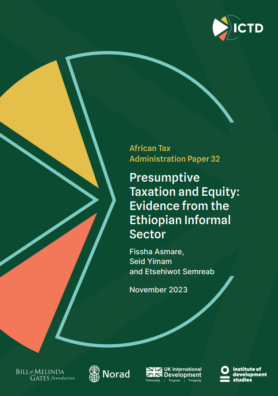African Tax Administration Paper 32
Presumptive tax has become a popular way of taxing businesses operating in the informal sector across middle- and low-income countries. However, evidence on the unintended effects of presumptive tax systems is scant and the effects themselves are not yet clearly known. Presumptive taxation in general has been much criticised, and public outcry and complaints have emerged due to its alleged unfairness and a lack of clarity in its implementation. The case of Ethiopia is no different. It is expected that a simple imposition of the presumptive tax system to tax the informal sector without considering stylised facts in the sector would have various negative consequences, especially in terms of the repercussions on equity.
This study examines the issue empirically in the case of Ethiopia and is probably the first study of its kind in the country. We explore the equity implications of the presumptive tax system to tax the informal sector in Addis Ababa, Ethiopia. We also critically evaluate income distribution among informal sector operators considering various social stratifiers such as gender. The main dataset we use to address our research questions is the informal micro enterprise (IME) survey data collected by BAN-Development Research Centre for Excellence (BAN-DRCE) in collaboration with Stichting Nederlandse Vrijwilligers (SNV) Ethiopia from Addis Ababa in 2021. Employing descriptive analysis and a representative taxpayer approach, we find that informal sector taxation using the turnover-based presumptive tax system would be both horizontally and vertically inequitable.
Our analysis shows that about 44 per cent of informal sector businesses which participated in the survey earn below the minimum formal sector business income tax threshold. Most of these 44 per cent of businesses are owned by women. The plausible reasons for the inequitable taxation of the informal sector are the complexity of how the presumptive tax burden is determined, and lack of clarity on this process. Therefore, the presumptive tax system in Ethiopia requires a serious discussion that extends up to revision.
